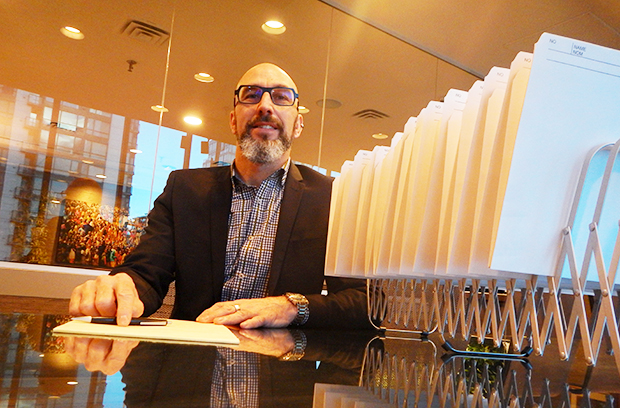Riding the paralegal boom: Alumnus Yves Moisan
A day in the paralegal life with Capilano University alumnus Yves Moisan.

When Yves Moisan started working as a corporate paralegal nearly 30 years ago in Montréal, the industry looked a lot different than what it is today. Rather than a computer, he used a typewriter. Rather than a Google search engine, a hard copy of the Business Corporations Act was his reference tool. What took hours then, takes minutes now.
“Stuff that I used to do—oh my god. Producing the work is so much easier now,” recalls the Capilano University graduate, who completed the University’s paralegal program in 2007.
With the arrival of the Internet and the many technological advances along the way, the profession is starting to “explode” now, according to Yves, who also happens to be the president of the B.C. Paralegal Association—a position he’s held for the last four years. “Everybody’s realized what they can do with a paralegal. Since last year, we’ve grown by an additional 120 members.”
Yves’ current employer is Mogan Daniels Slager LLP, a boutique firm in downtown Vancouver specializing in mergers and acquisitions. As a Transactions Paralegal, he typically spends most of his day on the computer, performing various research tasks and preparing all the documentation needed when a client buys or sells a business. It’s also not unusual for him to be in the room when the transaction takes place, making sure every “i” and “t” are dotted and crossed, and that all signatures on the contracts are properly accounted for.
Despite gaining his paralegal credentials back in Quebec, Yves’ decision to attend CapU—rather than be grandfathered into the system because of his extensive resumé—is one he says he doesn’t regret.
“The market has been asking for employees with paralegal degrees. It was a prerequisite for each job I got after graduating—they wanted somebody with that piece of paper,” Yves says. “People are starting realize that it’s an asset to have those individuals, because we can do more.”
Instead of hiring five associates, he notes, a firm may decide to bring in two paralegals to do the same workload at a lower cost.
Thinking like a lawyer
He adds that once he finished the program, he was able to think “like a lawyer”—something he says didn’t come so naturally before. It takes a certain type of person to do the job, Yves says; the key skill is resourcefulness.
“Sometimes, I’m thrown into a situation where I need to find very specific information. I need to know where to look for it and I don’t want to spend too much time doing it.”
Keeping technology and computer skills up-to-date doesn’t hurt, either, he says. “I want to make sure I’m using every shortcut that exists,” he explains.
At the end of the day, he suggests that anyone looking to pursue the paralegal path needs to understand that it’s a lot of work—sometimes 10 to 12 hours a day. However, Yves says if individuals aren’t afraid to work hard, the rewards do come with time.
“Be willing to learn and to grow,” Yves suggests. “Every day I learn something new and that’s what I find really exciting about my role—I always discover something different.”
Submitted by: Communications & Marketing, written by Tereza Verenca
